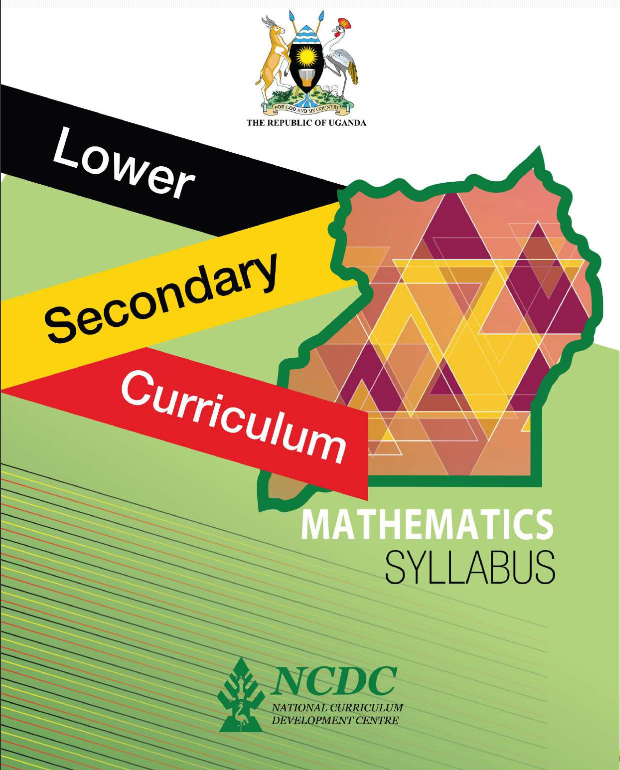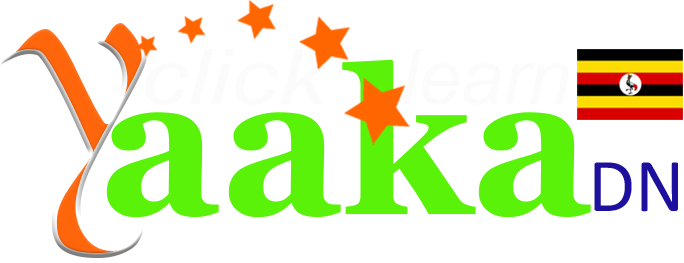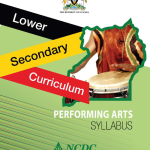
Mathematics New Lower Secondary Curriculum Syllabus
Mathematics forms a key element of every learner’s education. The Mathematics programme of study emphasises the essential mathematical skills that all citizens need for full and effective participation in civil, social and economic life. The programme of study focuses primarily on the needs of the
majority of learners, some of who may cease formal schooling before the end of Senior Four. It will allow these learners to take a wide range of formal or informal workplace opportunities, or to proceed to other post-Senior 4 programmes.
Prior to the reform, Mathematics, throughout the Lower Secondary years was strongly geared towards the needs of the small minority of learners who might eventually go on to study Mathematics at Advanced Level and beyond. The Mathematics programme in the reformed curriculum takes care of special learning needs. It is designed to ensure that the majority of learners will leave school with a worthwhile,
relevant qualification in the Mathematics that they will actually use in everyday life and work. In their daily life, knowingly or unknowingly, every human being uses and applies mathematical concepts in a wide range of contexts.
Numeracy skills are essential to every aspect of both work and daily life. Mathematics has evolved across all cultures over the years, and it is still developing.
The study of Mathematics develops the learners’ reasoning and logical thinking skills, and its applications cut across all Learning Areas. During the learning process, the beauty of Mathematics and its value in a wide range of contexts are recognised by the learner.
The Lower Secondary Mathematics programme of study focuses on developing mathematical understanding, logical reasoning, problem-solving and analytical thought. The concepts, understandings and skills acquired will help learners to solve familiar and unfamiliar problems, giving them the
flexibility they need to meet new situations as they arise. The learners will be confident with the Mathematics that they use in their day-to-day activities in the home, in the workplace, in
the community, and in society. They will also be ready to participate in civil life, using their mathematical skills to make informed decisions based on a sound understanding of facts, figures and opinions.
The skills and understandings that the learners acquire will be helpful throughout their lives. They will provide the essential mathematical tools required for a wide range of career paths including many of those in the fields of engineering, science or technology.
Teaching and Learning Mathematics
The thrust of the new syllabuses is experiential and towards deeper understanding. The focus in Mathematics is on the development of understanding through mathematical enquiry and rational thought. The syllabus provides learners with a wide range of contexts in which to develop this understanding, and these contexts are designed to engage the interest of the learner and to provide
opportunities to build life-related knowledge, experience and skills. Teachers are encouraged to go beyond the textbooks and provide as many meaningful contexts as possible. The generic skills have been integrated throughout the curriculum and can only be acquired through active approaches.
The role of the teacher is to build on learners’ existing knowledge and experience and to extend that by posing problems to the learners. This makes them think about their own ideas and experiences as well as adding new knowledge and skills to it.
Learners need to interact with real situations inside and outside the classroom. They need to look at pictures or diagrams, examine statistics, or read texts from a range of sources. They need to find out knowledge and ideas for themselves. They should then be expected to express these in their own words,
not those of the teacher, and so demonstrate that they have understood what they have learnt.
In this approach, learners are encouraged to:
- Be responsible for their own learning
- Think for themselves and form their own ideas and opinions
- Become critical thinkers, ready to face new challenges and situations for themselves
- Mathematics is divided into four themes that run throughout the four years of study. The following are the themes: Numbers, Geometry, Measures, Data and probability and patterns and Algebra.
Download the Syllabus Here
- baroque books new curriculum download pdf
- biology new curriculum notes
- Biology New Lower Secondary Curriculum Syllabus
- challenges of the new curriculum in uganda
- challenges of the new lower secondary curriculum in uganda
- difference between old curriculum and new curriculum in uganda
- disadvantages of the new curriculum in uganda
- features of the new lower secondary curriculum in uganda
- how to award marks in the new curriculum
- mathematics
- mathematics s1
- mathematics syllabus
- National Curriculum Development Centre
- ncdc art and design textbook pdf
- ncdc biology textbook pdf
- ncdc biology textbook pdf senior two
- ncdc download
- ncdc lower secondary curriculum
- ncdc mathematics textbook pdf
- ncdc new curriculum books pdf
- ncdc new curriculum syllabus books pdf
- ncdc physics textbook pdf download
- ncdc projects
- ncdc prototype books pdf
- ncdc publications
- ncdc senior one new curriculum
- ncdc senior one notes
- ncdc syllabus
- ncdc syllabus pdf
- ncdc textbooks download s2
- ncdc textbooks s2
- ncdc uganda
- new curriculum 2022
- new curriculum chemistry syllabus
- new curriculum for lower secondary
- new curriculum for secondary schools in uganda 2022
- new curriculum in uganda 2022 pdf
- new curriculum in uganda 2023
- new lower secondary curriculum
- new lower secondary curriculum in uganda pdf
- new lower secondary curriculum pdf
- new lower secondary curriculum syllabus
- new lower secondary curriculum syllabus books
- new lower secondary curriculum uganda
- new secondary school curriculum in uganda
- physics syllabus new curriculum
- s.2 biology notes new curriculum
- senior two biology topics
- subjects to be taught in the new curriculum
- What are the new subjects for the new curriculum
 Command Your Timeline: Heal the Past, Design Your FutureIntelligence,Skills Development
Command Your Timeline: Heal the Past, Design Your FutureIntelligence,Skills Development  SHAPTA MOCKS 2024
SHAPTA MOCKS 2024 Ultimate Me: Unlock Your Ultimate Potential & Energy HealingIntelligence,Skills Development
Ultimate Me: Unlock Your Ultimate Potential & Energy HealingIntelligence,Skills Development  NLSC: SENIOR THREE AGRICULTUREAgriculture,New Lower Secondary Curriculum,Ordinary Secondary
NLSC: SENIOR THREE AGRICULTUREAgriculture,New Lower Secondary Curriculum,Ordinary Secondary  NLSC: SENIOR THREE CHEMISTRY
NLSC: SENIOR THREE CHEMISTRY
 What is ChatGPT?General
What is ChatGPT?General- Meet Musinguzi John Paul – Your AI Teacher of Christian Religious Education for O-Level in UgandaEducation
- Meet Mbabazi Bridget – Your AI Teacher of Entrepreneurship for O-Level in UgandaEducation
- Meet Alinda Violet – Your AI Agriculture Teacher for O-Level in Uganda!Education
- Meet Aheebwa Joseph – Your AI Mathematics Teacher for O-Level Uganda!Education
- Meet Musinguzi Robert — Your AI Geography Teacher for O-Level in Uganda!Education
NLSC: SENIOR THREE CHEMISTRY
 Opul BonnyzQUESTION 2
Opul BonnyzQUESTION 2 colline mwangaENG/P/7: RIGHTS, RESPONSIBILITIES AND FREEDOM
colline mwangaENG/P/7: RIGHTS, RESPONSIBILITIES AND FREEDOM Aheebwa JosephDP: Digital Pedagoggy Assignment7
Aheebwa JosephDP: Digital Pedagoggy Assignment7 Aheebwa JosephDP: Digital Pedagogy Assignment5
Aheebwa JosephDP: Digital Pedagogy Assignment5 Aheebwa JosephDP: Digital Pedagogy Assignment4
Aheebwa JosephDP: Digital Pedagogy Assignment4 Aheebwa JosephDP: Digital Pedagogy Assignment2
Aheebwa JosephDP: Digital Pedagogy Assignment2 Aheebwa JosephDP: Digital Pedagogy Final Project
Aheebwa JosephDP: Digital Pedagogy Final Project






0 responses on "Mathematics New Lower Secondary Curriculum Syllabus"